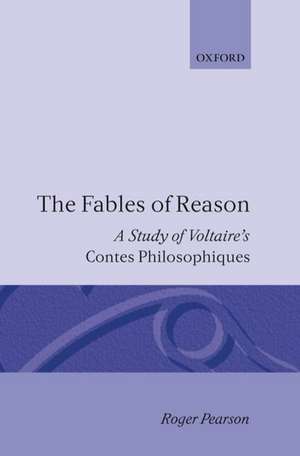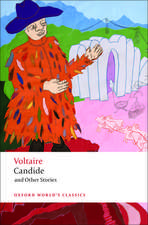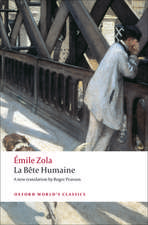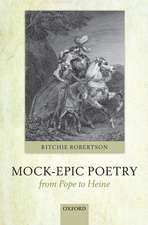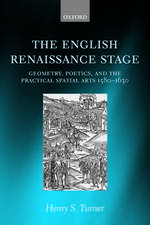The Fables of Reason: A Study of Voltaire's Contes Philosophiques
Autor Roger Pearsonen Limba Engleză Hardback – 6 mai 1993
Preț: 1503.80 lei
Preț vechi: 2292.40 lei
-34% Nou
Puncte Express: 2256
Preț estimativ în valută:
287.74€ • 300.43$ • 238.15£
287.74€ • 300.43$ • 238.15£
Carte tipărită la comandă
Livrare economică 25-31 martie
Preluare comenzi: 021 569.72.76
Specificații
ISBN-13: 9780198158806
ISBN-10: 0198158807
Pagini: 280
Dimensiuni: 143 x 222 x 31 mm
Greutate: 0.49 kg
Editura: Clarendon Press
Colecția Clarendon Press
Locul publicării:Oxford, United Kingdom
ISBN-10: 0198158807
Pagini: 280
Dimensiuni: 143 x 222 x 31 mm
Greutate: 0.49 kg
Editura: Clarendon Press
Colecția Clarendon Press
Locul publicării:Oxford, United Kingdom
Recenzii
'... underlying the conceptual uncertainties in Pearson's arguments is a comprehensive, continuously interesting and attractively written analysis of Voltaire's art as a story-teller.'Edward James. Journal of European Studies. '94
'a very good book ... Pearson has surveyed what he calls the "fables of reason" in a solid, exegetical style and has provided, at the end of his essay, a provocative discussion of the two radical interpretations conferred on Voltaire - as the apostle of Enlightenment (Paul Valéry) or the precursor of twentieth-century totalitarianism (Isaiah Berlin). What distinguishes Pearson's essay is his readiness to take on the big names in Voltaire studies and offer more nuanced views of Voltaire's purposes and attitudes. Among the many gold nuggets of information found in this book some of the most lustrous are found in the chapter on Candide, wonderfully instructive treatise.'Arnold Ages, University of Waterloo, Eighteenth-Century Fiction 7:1
The paucity of general studies on Voltair'e fiction makes this one extremely welcome. This excellent study will contribute much to the appreciation of the contes, and deserves to be widely read.
Here is, surprisingly enough, the very first study to examine all twenty-six Contes individually as well as collectively. This in itself makes it an important book.
Roger Pearson's excellent general study of Voltaire's fiction fills another surprising gap. A great deal has been written about individual tales, groups of tales, and particular aspects (technique, style, influences, sources, ideas) of the contes as a whole, but the broad perspective has been lacking. Pearson's overview, managed with an enviable lightness of touch and sound critical sense, goes beyond the worthy mise au point and makes an absorbing case for seeing Voltaire not as a novelist but as a maker of fables.
'a very good book ... Pearson has surveyed what he calls the "fables of reason" in a solid, exegetical style and has provided, at the end of his essay, a provocative discussion of the two radical interpretations conferred on Voltaire - as the apostle of Enlightenment (Paul Valéry) or the precursor of twentieth-century totalitarianism (Isaiah Berlin). What distinguishes Pearson's essay is his readiness to take on the big names in Voltaire studies and offer more nuanced views of Voltaire's purposes and attitudes. Among the many gold nuggets of information found in this book some of the most lustrous are found in the chapter on Candide, wonderfully instructive treatise.'Arnold Ages, University of Waterloo, Eighteenth-Century Fiction 7:1
The paucity of general studies on Voltair'e fiction makes this one extremely welcome. This excellent study will contribute much to the appreciation of the contes, and deserves to be widely read.
Here is, surprisingly enough, the very first study to examine all twenty-six Contes individually as well as collectively. This in itself makes it an important book.
Roger Pearson's excellent general study of Voltaire's fiction fills another surprising gap. A great deal has been written about individual tales, groups of tales, and particular aspects (technique, style, influences, sources, ideas) of the contes as a whole, but the broad perspective has been lacking. Pearson's overview, managed with an enviable lightness of touch and sound critical sense, goes beyond the worthy mise au point and makes an absorbing case for seeing Voltaire not as a novelist but as a maker of fables.
